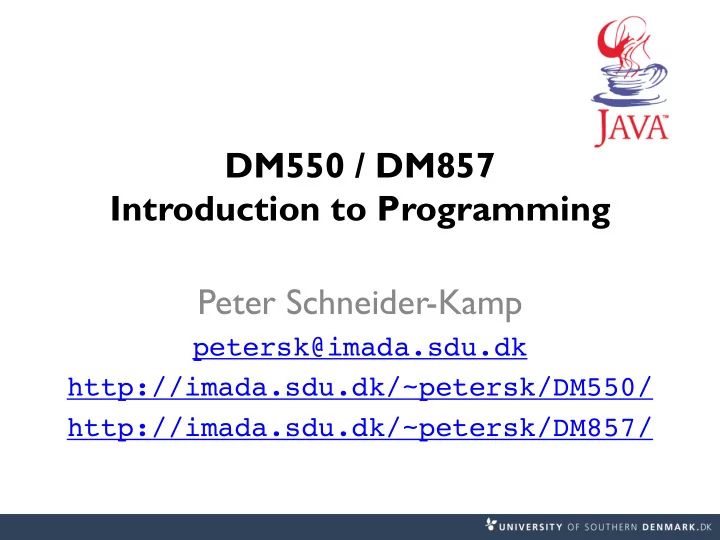

DM550 / DM857 Introduction to Programming Peter Schneider-Kamp petersk@imada.sdu.dk http://imada.sdu.dk/~petersk/DM550/ http://imada.sdu.dk/~petersk/DM857/
ADVANCED OBJECT -ORIENTATION 2 June 2009
Object-Oriented Design § classes often do not exist in isolation from each other § a vehicle database might have classes for cars and trucks § in such situation, having a common superclass useful § Example: public class Vehicle { public String model; public int year; public Vehicle(String model, int year) { this.model = model; this.year = year; } public String toString() {return this.model+" from "+this.year;} } 3 June 2009
Extending Classes § Car and Truck then extend the Vehicle class § Example: public class Car extends Vehicle { public String colour; public Car(string model, int year, String colour) { this.colour = colour; // this makes NO SENSE } public String toString() { return this.colour; } } public class Truck extends Vehicle { public double maxLoad; … } 4 June 2009
Class Hierarchy § class hierarchies are parts of class diagrams § for our example we have: Object is-a is-a Vehicle is-a Car Truck 5 June 2009
Abstract Classes § often, superclasses should not have instances § in our example, we want no objects of class Vehicle § can be achieved by declaring the class to be abstract § Example: public abstract class Vehicle { public String model; public int year; public Vehicle(String model, int year) { this.model = model; this.year = year; } public String toString() {return this.model+" from "+this.year;} } 6 June 2009
Accessing Attributes § attributes of superclasses can be accessed using “this” § Example: public class Car extends Vehicle { public String colour; public Car(string model, int year, String colour) { this.model = model; this.year = year; this.colour = colour; } public String toString() { return this.colour+" "+this.model+" from "+this.year; } } 7 June 2009
Accessing Superclass § methods of superclasses can be accessed using “super” § Example: public class Car extends Vehicle { public String colour; public Car(String model, int year, String colour) { this.model = model; this.year = year; this.colour = colour; } public String toString() { return this.colour+" "+super.toString(); } } 8 June 2009
Superclass Constructors § constructors of superclasses can be accessed using “super” § Example: public class Car extends Vehicle { public String colour; public Car(string model, int year, String colour) { super(model, year); this.colour = colour; } public String toString() { return this.colour+" "+super.toString(); } } 9 June 2009
Abstract Methods § abstract method = method declared but not implemented § useful in abstract classes (and later interfaces) § Example: public abstract class Vehicle { public String model; public int year; public Vehicle(string model, int year) { this.model = model; this.year = year; } public String toString() {return this.model+" from "+this.year;} public abstract double computeResaleValue(); } 10 June 2009
Implementing Abstract Methods § abstract methods need to be implemented in concrete subclasses § use same function signature, but without “abstract” § Example: public class Car extends Vehicle { ... public double computeResaleValue() { double value = 100000 * (this.model.startsWith("Audi") ? 6 : 4); value *= (this.year-2000)/20; return value; } } 11 June 2009
Interfaces § different superclasses could have different implementations § to avoid conflicts, classes can only extend one (abstract) class § interfaces = abstract classes without implementation § only contain public abstract methods (abstract left out) § no conflict possible with different interfaces § Example: public interface HasValueAddedTax { public double getValueAddedTax(double percentage); } public class Car implements HasValueAddedTax { public double getValueAddedTax(double p) { return 42000; } … } 12 June 2009
Interfaces § Example: public interface HasValueAddedTax { public double getValueAddedTax(double percentage); } public interface Destructible { public void destroy(); } public class Car implements HasValueAddedTax, Destructible { public double getValueAddedTax(double p) { return 42000; } public void destroy() { this.model = "BROKEN"; } … } 13 June 2009
Interface and Class Hierarchy § interfaces outside normal class hierarchy HasValueAddedTax Destructible Vehicle Car Truck 14 June 2009
Inner Classes § classes and interfaces can be nested § inner class = class contained in another class § Example: public abstract class Vehicle { … public interface Destructible { public void destroy(); } public class Car extends Vehicle implements Destructible { … } } 15 June 2009
Local Classes § classes and interfaces can be declared in function bodies § local class = class contained in the body of a function or method § Can obviously not be public § Example: public static void main(String[] args) { class Bicycle implements Destructible { public void destroy() { System.out.println("Ouch!"); } } new Bicycle().destroy(); } 16 June 2009
Anonymous (Sub-)Classes § possible to create anonymous classes § often used to instantiate abstract classes or interfaces § body of class defined after constructor call § Example: public class FarmVillain { public static void main(String[] args) { Vehicle x = new Vehicle("Volvo T230",1971) { public double computeResaleValue() { return 25000; } }; } } 17 June 2009
Final Modifier § variables only assigned once can be declared final § multiple assignment to final variable results in compiler error § Example: final int x; x = 42; // ok x = 23; // ERROR 18 June 2009
Local and Anonymous Classes § local and anonymous classes can access local variables and parameters IF they are final § Example: public static makeTractor(String model, int year, final int base) { final double factor = (year-1920)/100; return new Vehicle(model,year) { public int computeResaleValue() { return base*factor; } }; } 19 June 2009
Recommend
More recommend